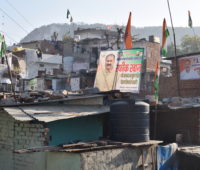In the slum settlements of India, individual slum leaders, acting as party workers, play dynamic roles that connect local residents to national political parties. This local leadership aids residents in making demands for public services, and also mobilizes votes, but it also means there are great disparities in the level of local services and development. In this essay for our “Layered Metropolis” series, based on his book Demanding Development: The Politics of Public Good Provision in India’s Urban Slums, Adam Auerbach examines the work of local leaders and party networks in two north Indian cities to understand this phenomenon.













